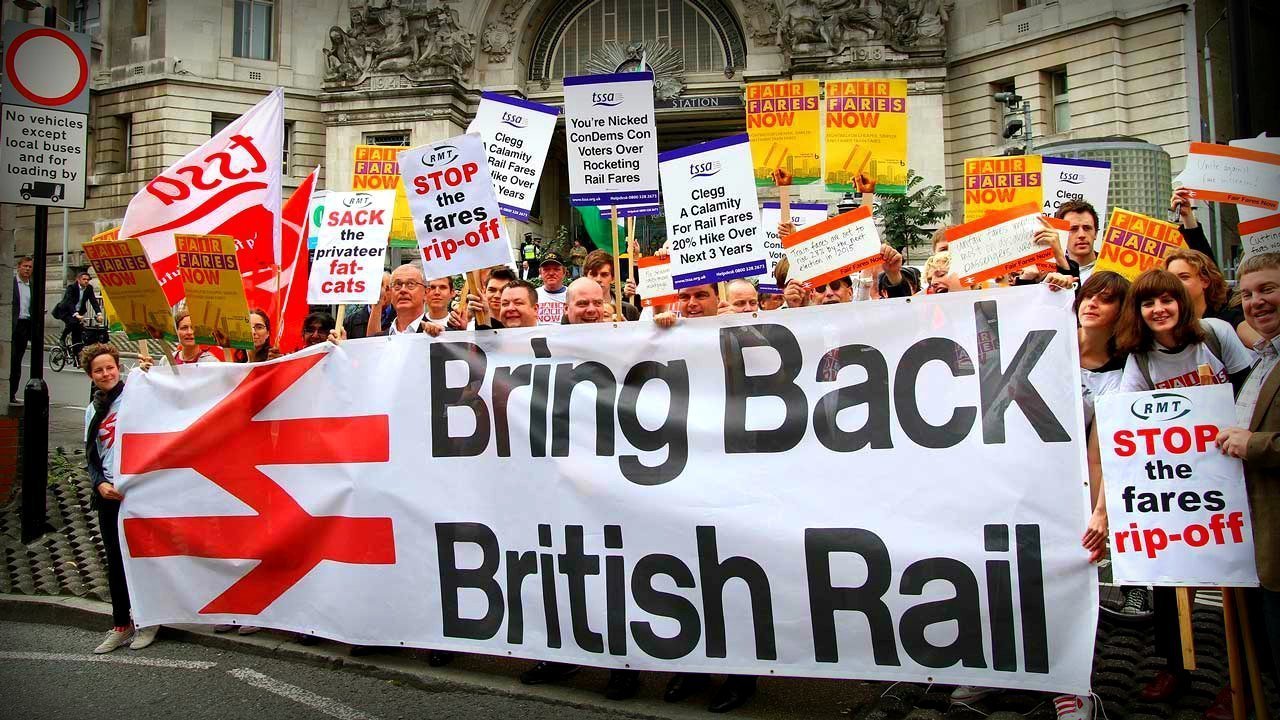As a result of the dispute between railway workers and Southern Rail this winter, the question of railway nationalisation has come up in public consciousness again. John Russell of the UEA Marxists puts forward the demand for immediate renationalisation of the railways without compensation.
After prolonged strike action rose to a climax in the dispute between railway workers and Southern Rail this winter, the question of railway nationalisation has come up in public consciousness again. Indeed, the chaos resulting from mismanagement by the Southern operator, Govia Thameslink Railway, has even led the Department for Transport to consider re-nationalisation of the service.
The Southern strikes are only part of an ongoing struggle by railway workers and users, against the big profiteering companies that control our railways services.
Each time a survey is done, opinion polls have found that there is a huge majority of public support for the nationalisation of the railway companies. Labour voters, Tory voters, Green voters, and UKIP voters all agree: our railways should be owned publicly, and run for people not profits.
The costs of privatisation
Since privatisation of British Rail began in 1993, following the Railways Act, private railway companies have made it their mission to lower their costs and yet charge higher and higher fares; raise profits and cut corners on service; and generally rip off the public, in order to line their bulging pockets.
In the last ten years, average rail fares across the UK have risen twice as fast as average wages. Rail services have become increasingly unreliable, crowded, and over-priced. Not only has privatisation been a disaster for the public, but it’s been a disaster for the government too: the state spends billions of pounds every year on subsidising private railway companies. The cost of running the railway has more than doubled in real terms since privatisation began in 1993, from £2.4bn per year from 1990 to 1994, to approximately £5.4bn per year from 2005 to 2010.
In this period of capitalist crisis and austerity – a period of cuts to public services, cuts to wages, and increasing underemployment – the issue of declining service and rising prices for the railways can no longer be overlooked. People have had enough, and are looking to socialist policies as a concrete alternative.
Left leaders lagging behind
All over the country, local groups have been working hard, in conjunction with the RMT (Rail, Maritime and Transport Union), to campaign for re-nationalisation of the railways. At a local meeting in Norwich, Norfolk – hardly a hotbed for revolutionary or radical political activity – the local action group Nor4NOR (Norfolk for the Nationalisation of the Railways) organised a meeting of MPs and representatives from the rail industry, to discuss the question of railway nationalisation. Over 100 people turned out on a rainy Thursday evening, to a small room in a church in the centre of town.
Speeches from Caroline Lucas (Green Party MP for Brighton Pavilion) and Clive Lewis (Labour Party MP for Norwich South) once again highlighted how even the most progressive elements of the British parliament are lagging behind the rising appetite for socialist policies in society. Despite their support for the nationalisation of the railways, Lucas and Lewis spoke of “a gradual process” in which rail services would be handed back to the state when the existing private contracts elapsed. Essentially, they proposed the non-renewal of privatised contracts, rather than a radical socialist programme of actually seizing these assets and bringing them back under public control.
The “cost of compensation” to the private companies that currently own the rail contracts was given as the reason for not immediately taking services back under public control. Caroline Lucas said that this process of waiting for elapsed contracts would take perhaps 30 years to complete. This kind of slow, piecemeal re-nationalisation falls far short of what is needed and what the public want.
Renationalise now!
Steve Hedley, the Assistant General Secretary of the RMT Union, however, set them straight: these assets were stolen from public ownership by an act of parliament in 1993, and sold off to private companies. The public were not consulted on this decision, and were given no compensation when their assets were taken from them – so why should these private companies get that luxury now?
These private companies have run our rail services into the ground, and repeatedly demonstrated their inability to provide a decent service, all the while taking huge profits. Hedley called for full and immediate re-nationalisation of the railways, without compensation. That was the call that got the biggest cheers from the crowd. Why would we compensate the people that have been systematically ripping us off, exploiting the labour of railway workers, and making huge profits out of it all, for years?
The mood in society is getting increasingly radicalised. Ordinary people are getting fed up of the failures of privatisation, and sick to the stomach of services run for profit, rather than for people. This is why we stand by our programme: Socialist Appeal calls for a socialist government to take over the key levers of the economy – the top 150 monopolies, big businesses, and banks that dominate our lives – without compensation, and have them placed under democratic public ownership and control. This is a programme that the public can truly get behind.






